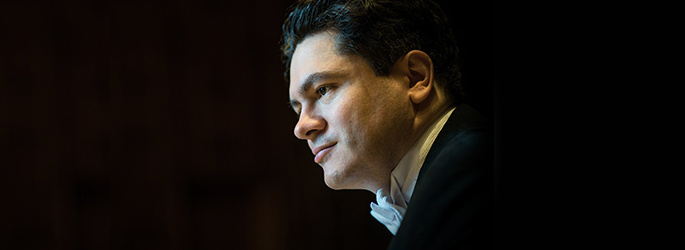There has been a lot of subbing at the LA Phil recently. A little less than a month ago the young pianist Behzod Abduraimov replaced violinist Leila Josefowicz (see https://culturespotla.com/2014/10/review-juanjo-mena-and-behzod-abduraimov-perform-prokofiev-and-dvorak-with-the-la-phil/). And this past weekend, the young Conductor-in-Residence of the Philadelphia Orchestra, Cristian Macelaru, replaced Charles Dutoit (who just happens to be Conductor Laureate of the Philadelphia Orchestra), who had to withdraw due to a shoulder injury. It wasn’t the first time Macelaru has stepped in for a renowned conductor — he replaced none other than Pierre Boulez in Chicago and Jaap van Zweden in Philadelphia. So this 2012 winner of the Georg Solti Emerging Conductor Award is getting a lot of practice, and if Sunday’s concert was any indication, he is no longer emerging, but has emerged.
Dutoit had selected a program that was rich with orchestral textures and included Ravel’s Rapsodie espagnole, the West Coast premiere of the Concerto Grosso for Three Cellos by Polish composer Krzysztof Penderecki, and the Enigma Variations, Op. 36, by Elgar. So, it was no small feat for Macelaru not only to try to fill the big shoes of Dutoit, especially with only two weeks notice, but with a program that was very Dutoitesque. On Sunday, Cristian Macelaru didn’t just replace Dutoit, he fashioned his own musical world for the audience.
With the Ravel and Elgar, Macelaru was able to elicit performances from the orchestra that rendered the pieces fresh and exciting. His interpretations were so nuanced that they seemed as if they were the composers’ own. There were no missed notes or hesitant entrances even when the score called for pianissimo. For a conductor who seemed tethered to the scores, which Macelaru used for each piece, the resulting sounds were astounding. It’s really hard to imagine the Phil sounding better than they did under Macelaru’s direction. In fact he was so pleased with them, he applauded along with the audience at the conclusion of the Elgar.
The Concerto Grosso by Penderecki, though dark and somber, is surprisingly consonant even with its flashes of modernity. There were glimmers of Shostakovich, and the march-like section was reminiscent of Strauss’ Ein Heldenleben, all somewhat surprising for a composer who in the 1960s led the Polish avant-garde. The orchestration for the Concerto Grosso didn’t change much from the Ravel. Penderecki took full advantage of the color available to his palette, but he didn’t overdo it; the percussion instruments were used sparingly and to great effect, and there were melodic and haunting solos for horn, English horn and violin. The three cellists — Claudio Bohórquez, Arto Noras and Li-Wei Qin — all soloists in their own right, played with passion, and the concerto, which at times called for bow-shredding playing by the soloists, was a feast for the ears. There’s no doubt that Dutoit would have been very pleased with this performance of a piece that was not only commissioned by him, but also dedicated to him.
After intermission, Macelaru and the orchestra continued their afternoon love affair with a stirring rendition of Elgar’s Enigma Variations. Macelaru sculpted each of the variations as the compositional gems they are, but he wove them together to produce an extraordinary performance of Elgar’s orchestral masterpiece. For those who knew the piece, it was difficult to resist the urge to sing along to Elgar’s infectious melodies.
The LA Phil has a knack for attracting young dynamic conductors, and Macelaru is the second in a little less than a month (Juanjo Mena was the other). The LA Phil has been following Macelaru for quite some time, and Dutoit’s cancellation provided the perfect opportunity to invite him to L.A. For those patrons who only want to hear the Salonens, Mehtas and Dutoits, you had better pay attention to the Menas and Macelarus because you will be hearing a lot more about them — they are the future of the conducting world.
—Henry Schlinger, Culture Spot LA
For information about upcoming concerts, visit www.laphil.com.






